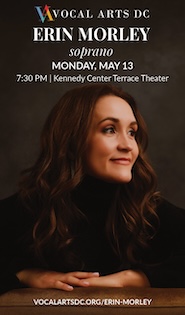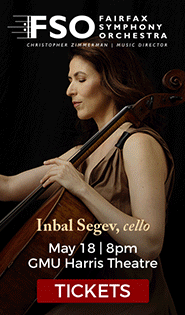Lisette Oropesa shines brightest in opera with Vocal Arts DC

Lisette Oropesa performed a recital for Vocal Arts DC Saturday night.
Lisette Oropesa has appeared at Washington National Opera and Washington Concert Opera in recent years. The Louisiana-born soprano made her recital debut with Vocal Arts DC on Saturday evening, at the UDC Theatre of the Arts. While the songs, especially those of Samuel Barber, suited her small, sunny voice just fine, it was in opera arias bookending the concert that she truly excelled.
The evening opened with “Ragion nell’alma siede,” an aria from Haydn’s opera Il mondo della luna. It was a gutsy move, and Oropesa easily filled the smaller venue with sound. The accuracy during runs was striking, as were the highest notes, all produced with facility. Her tone turned especially limpid on the little cadenza. Pianist Vlad Iftinca, who was a consummate musical partner throughout the program, gave vitality to the long introduction to the piece.
In the sets of songs that followed, however, Oropesa did little to differentiate tonal colors or characterizations. In the three solo songs of Schubert’s Gesänge aus ‘Wilhelm Meister’ — the first song in the set is a duet — Oropesa made a demure, refined sound as Mignon. The songs are all sad and slow, and Oropesa phrased them with considerable beauty but little variety.
A selection from Mendelssohn’s Sechs Lieder, Op. 57, was less homogeneous, mostly because of the agile fingers of Iftinca, on the agitated repeated chords of “Suleika,” for example. Oropesa’s breath support flagged at the ends of the longer phrases of “Venetianisches Gondellied,” but in the exquisite “Wanderlied,” both singer and pianist wove a romantic spell.
Her intense vibrato crept into the first of the Deux poèmes de Louis Aragon by Francis Poulenc. When it disappeared, as on the high note on the word “délaissée,” the intonation and needed brightness locked into place. Oropesa was charming on the surrealist patter song “Fêtes galantes,” singing it again as her second encore at the end of the evening. Both times the tempo choice was so fast that the French was practically undiscernible.
The Four Songs, Op. 13, of Samuel Barber suited Oropesa’s voice and temperament. In the intense miniature “A Nun Takes the Veil,” she was composed and somehow secretive. The irregular meter of “The Secrets of Old” came off as effortless, with expressive lines from both pianist and singer. In “Sure on This Shining Night,” set to a light-filled poem by James Agee, Oropesa radiated a luminous confidence, then opened up further in the closing “Nocturne.”
The set of Canciones clasicas españiolas by Fernando Obradors made for a clever closer. In the first song, “La mi sola, Laureola,” those first three words, meaning “My one and only (Laureola),” are set to the notes A-E-G-A, or “la-mi-sol-la” in solfege. Still Oropesa didn’t convince, lacking the dramatic flair and the lower range needed to bring these meaty songs to life.
A substantial encore, the aria “Robert! toi que j’aime” from Meyerbeer’s Robert le Diable, brought out the subtle strengths of Oropesa’s voice, especially her stunning high pianissimos. If only Washington National Opera would mount a Meyerbeer opera.
Soprano Anne Schwanewilms returns to the Vocal Arts DC roster in an all-Strauss recital with pianist Malcolm Martineau 7:30 p.m. April 20, at the UDC Theatre of the Arts. vocalartsdc.org; 202-669-1463.




